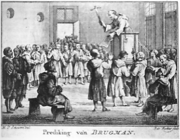
John Brugman
Encyclopedia

Franciscan
Most Franciscans are members of Roman Catholic religious orders founded by Saint Francis of Assisi. Besides Roman Catholic communities, there are also Old Catholic, Anglican, Lutheran, ecumenical and Non-denominational Franciscan communities....
preacher from Flanders
Flanders
Flanders is the community of the Flemings but also one of the institutions in Belgium, and a geographical region located in parts of present-day Belgium, France and the Netherlands. "Flanders" can also refer to the northern part of Belgium that contains Brussels, Bruges, Ghent and Antwerp...
.
Biography
He was born at KempenKempen
Kempen may refer to:*Kempen, Germany, a town in North Rhine-Westphalia, Germany;*the German name of the Polish town of Kępno, or the former Prussian district Kreis Kempen;*the Dutch and Belgian region of Kempen, usually called Campine in English...
in the archdiocese of Cologne, towards the end of the preceding century; died at Nijmegen, Netherlands, 19 September 1473.
He became lector
Lector
Lector is a Latin term for one who reads, whether aloud or not. In modern languages the word has come to take various forms, as either a development or a loan, such as , , and . It has various specialized uses:...
of theology, vicar-provincial and one of the founders Cologne Province of the Friars of the Minor Observance. For twenty years his name was celebrated as the most illustrious preacher of the Low Countries
Low Countries
The Low Countries are the historical lands around the low-lying delta of the Rhine, Scheldt, and Meuse rivers, including the modern countries of Belgium, the Netherlands, Luxembourg and parts of northern France and western Germany....
. A friend of Denis the Carthusian
Denis the Carthusian
Denis the Carthusian , also known as Denys van Leeuwen or Denis Ryckel, was a Roman Catholic theologian and mystic.-Life:...
, it was at his suggestion that the latter wrote his work: "De doctrinâ et regulis vitae Christianæ", dedicating it to Father Brugman.
He also espoused the cause of the Brothers of the Common Life, which congregation, successfully devoted to the interests of education, had been established by two priests, Gerhard Groote and Florentius Radewiyns. He addressed them in the two letters which are still extant to strengthen them in the persecution to which they were subjected.
He died in the odour of sanctity
Odour of Sanctity
The odour of sanctity or odor of sanctity, according to the Catholic Church, is commonly understood to mean a specific scent that emanates from the bodies of saints, especially from the wounds of stigmata.-Meanings:...
and is commemorated in the Martyrologium Minoritico-Belgicum on 19 September.
Works
Father Brugman wrote two lives of St. Lidwina, the first of which, printed at Cologne in 1433, was reprinted anonymously at Louvain in 1448, and later epitomized by Thomas à KempisThomas à Kempis
Thomas à Kempis was a late Medieval Catholic monk and the probable author of The Imitation of Christ, which is one of the best known Christian books on devotion. His name means, "Thomas of Kempen", his home town and in German he is known as Thomas von Kempen...
at Cologne. The second life appeared at Schiedam in 1498; both have been embodied by the Bollandists in the Acta Sanctorum
Acta Sanctorum
Acta Sanctorum is an encyclopedic text in 68 folio volumes of documents examining the lives of Christian saints, in essence a critical hagiography, which is organised according to each saint's feast day. It begins with two January volumes, published in 1643, and ended with the Propylaeum to...
, 2 April.
He also wrote a devout "Life of Jesus."
Father Brugman ranked among the best poets of his day. Two of his poems "O Ewich is so lanc!" and "The Zielejacht" are included by Hoffmann von Fallersleben in his "Horae Belgicae" (II, 36, 41.).
His life was written by Willem Moll under the title "Joannes Brugman en het Godsdienstegen Leven Onzer Vaderen in de Vijftiende eeuw", and published at Amsterdam in 1854. It consists of two volumes, the second containing Brugman's unedited works.

